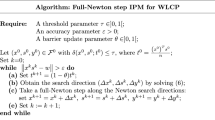Abstract
In this paper, we present a full-Newton feasible step interior-point algorithm for solving monotone horizontal linear complementarity problems. In each iteration the algorithm performs only full-Newton step with the advantage that no line search is required. We prove under a new and appropriate strategy of the threshold that defines the size of the neighborhood of the central-path and of the update barrier parameter that the proposed algorithm is well-defined and the full-Newton step to the central-path is locally quadratically convergent. Moreover, we derive the complexity bound of the proposed algorithm with short-step method, namely, \(\mathcal {O}(\sqrt{n}\log \frac{n}{\epsilon })\). This bound is the currently best known iteration bound for monotone HLCP. Some numerical results are provided to show the efficiency of the proposed algorithm and to compare with an available method.

Similar content being viewed by others
References
Achache, M.: A new primal-dual path-following method for convex quadratic programming. Comput. Appl. Math. 25, 97–110 (2006)
Achache, M.: Complexity analysis and numerical implementation of a short-step algorithm for LCP. Appl. Math. Comput. 216(7), 1889–1895 (2010)
Achache, M., Goutali, M.: Complexity analysis and numerical implementation of a full-Newton step interior-point algorithm for LCCO. Numer. Algorithms 70, 393–405 (2015)
Achache, M., Boudiaf, N.: Complexity analysis of primal-dual algorithms for the semi-definite linear complementarity problem. J. Numer. Anal. Approx. Theory 40(2), 95–106 (2011)
Achache, M.: Complexity analysis of an interior-point algorithms for the semi-definite optimization based on a kernel function with a double barrier term. Acta Math. Sin. Engl. Ser. 31(3), 543–556 (2015)
Bonnans, J.E., Gonzaga, C.C.: Convergence of interior-point algorithms for monotone linear complementarity problem. Math. Oper. Res. 21(1), 1–15 (1996)
Cottle, R.W., Pang, J.S., Stone, R.E.: The Linear Complementarity Problem. Academic, San Diego (1992)
Darvay, Z., Papp, I.M., TaKács, P.R.: Complexity analysis of a full-Newton step interior point method for linear optimization. Period. Math. Hung. 73(1), 27–42 (2016)
Huang, Z.H.: Polynomiality of high-order feasible interior-point method for solving the horizontal linear complementarity problems. J. Syst. Sci. Math. Sci. 20(4), 432–438 (2000)
Jiang, X., Zhang, Y.: A smoothing-type algorithm for absolute value equations. J. Ind. Manag. Optim. 9(4), 789–798 (2013)
Jiang, X., Zhang, Y.: An improved full-Newton step \(\cal{O}(n)\) infeasible interior-point method for horizontal linear complementarity problem. Numer. Algorithms 71(3), 491–503 (2016)
Mangasarian, O.L., Meyer, R.R.: Absolute value equations. Linear Algebra Appl. 419, 359–367 (2006)
Monteiro, R., Tsuchiya, T.: Limiting behavior of the derivatives of certain trajectories associated with a monotone horizontal linear complementarity problem. Math. Oper. Res. 21(4), 793–814 (1996)
Peng, J., Roos, C., Terlaky, T.: Self-regular functions and new search directions for linear and semi-definite optimization. Math. Program. 93, 129–171 (2002)
Rohn, J.: On unique solvability of the absolute value equation. Optim. Lett. 3, 503–506 (2009)
Roos, C., Terlaky, T., Vial, J.P.: Theory and Algorithms for Linear Optimization. An Interior Point Approach. Wiley, Chichester (1997)
Wang, G.Q., Bai, Y.Q.: Polynomial interior-point algorithms for \(P_{*}\)(\(\kappa \)) horizontal linear complementarity problem. J. Comput. Appl. Math. 233, 248–263 (2009)
Wright, S.J.: Primal-Dual Interior-Point Methods. SIAM, University City (1997)
Yong, L.: Iterative method for a class of linear complementarity problems. Int. Conf. Inf. Comput. Appl. 1, 390–398 (2010)
Zhang, L., Xu, Y.: A full-Newton step primal-dual interior-point algorithm for linear complementarity problem. J. Inf. Comput. Sci. 5(4), 305–313 (2010)
Zhang, Y.: On the convergence of a class of infeasible interior-point methods for horizontal linear complementarity problem. SIAM J. Optim. 4(1), 208–227 (1994)
Author information
Authors and Affiliations
Corresponding author
Rights and permissions
About this article
Cite this article
Achache, M., Tabchouche, N. A full-Newton step feasible interior-point algorithm for monotone horizontal linear complementarity problems. Optim Lett 13, 1039–1057 (2019). https://doi.org/10.1007/s11590-018-1328-9
Received:
Accepted:
Published:
Issue Date:
DOI: https://doi.org/10.1007/s11590-018-1328-9



